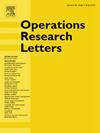断开连接带来健壮性?顶点截断匹配的网络设计
IF 0.9
4区 管理学
Q4 OPERATIONS RESEARCH & MANAGEMENT SCIENCE
引用次数: 0
摘要
本文研究了在对抗性顶点删除下支持大匹配的稀疏网络设计。我们发现,当稀疏性约束不那么严格时,连接结构(例如链型图)可以是最优的,而断开结构(例如簇型图)可以是最优的。我们描述了链条和集群的性能,以了解首选设计如何从前者过渡到后者。我们的分析表明,集群对中断的抵抗力更强,这使它们在高压力环境中更有优势。本文章由计算机程序翻译,如有差异,请以英文原文为准。
Disconnectedness Brings Robustness? On Network Design For Matching With Vertex Interdiction
This paper investigates sparse network designs that support large matchings under adversarial vertex deletions. We find that while connected structures (e.g., chain-type graphs) can be optimal when sparsity constraints are less stringent, disconnected structures (e.g., cluster-type graphs) can be optimal otherwise. We characterize the performance of chains and clusters to understand how the preferred design transitions from the former to the latter. Our analysis suggests that clusters are more robust to disruption, making them more advantageous in high-stress environments.
求助全文
通过发布文献求助,成功后即可免费获取论文全文。
去求助
来源期刊

Operations Research Letters
管理科学-运筹学与管理科学
CiteScore
2.10
自引率
9.10%
发文量
111
审稿时长
83 days
期刊介绍:
Operations Research Letters is committed to the rapid review and fast publication of short articles on all aspects of operations research and analytics. Apart from a limitation to eight journal pages, quality, originality, relevance and clarity are the only criteria for selecting the papers to be published. ORL covers the broad field of optimization, stochastic models and game theory. Specific areas of interest include networks, routing, location, queueing, scheduling, inventory, reliability, and financial engineering. We wish to explore interfaces with other fields such as life sciences and health care, artificial intelligence and machine learning, energy distribution, and computational social sciences and humanities. Our traditional strength is in methodology, including theory, modelling, algorithms and computational studies. We also welcome novel applications and concise literature reviews.
 求助内容:
求助内容: 应助结果提醒方式:
应助结果提醒方式:


